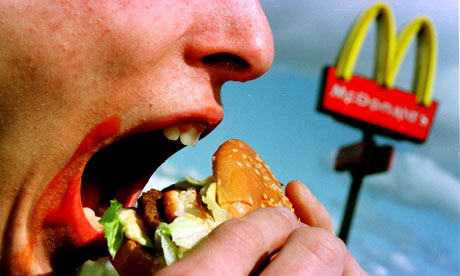McDonald's and other food companies will help write policy on obesity and diet-related diseases. Photograph: Murdo Macleod for the Guardian
The Department of Health is putting the fast food companies McDonald's and KFC and processed food and drink manufacturers such as PepsiCo, Kellogg's, Unilever, Mars and Diageo at the heart of writing government policy on obesity, alcohol and diet-related disease, the Guardian has learned.
In an overhaul of public health, said by campaign groups to be the equivalent of handing smoking policy over to the tobacco industry, health secretary Andrew Lansley has set up five "responsibility deal" networks with business, co-chaired by ministers, to come up with policies.
Some of these are expected to be used in the public health white paper due in the next month.
The groups are dominated by food and alcohol industry members, who have been invited to suggest measures to tackle public health crises. Working alongside them are public interest health and consumer groups including Which?, Cancer Research UK and the Faculty of Public Health. The alcohol responsibility deal network is chaired by the head of the lobby group the Wine and Spirit Trade Association.
The leading supermarkets are an equally strong presence, while the responsibility deal's physical activity group is chaired by the Fitness Industry Association, which is the lobby group for private gyms and personal trainers.The food network to tackle diet and health problems includes processed food manufacturers, fast food companies, and Compass, the catering company famously pilloried by Jamie Oliver for its school menus of turkey twizzlers. The food deal's sub-group on calories is chaired by PepsiCo, owner of Walkers crisps.
Professor Sir Ian Gilmore, the leading liver specialist and until recently president of the Royal College of Physicians, said he was very concerned by the emphasis on voluntary partnerships with industry. A member of the alcohol responsibility deal network, Gilmore said he had decided to co-operate, but he doubted whether there could be "a meaningful convergence between the interests of industry and public health since the priority of the drinks industry was to make money for shareholders while public health demanded a cut in consumption".In early meetings, these commercial partners have been invited to draft priorities and identify barriers, such as EU legislation, that they would like removed. They have been assured by Lansley that he wants to explore voluntary not regulatory approaches, and to support them in removing obstacles. Using the pricing of food or alcohol to change consumption has been ruled out. One group was told that the health department did not want to lead, but rather hear from its members what should be done.
He said: "On alcohol there is undoubtedly a need for regulation on price, availability and marketing and there is a risk that discussions will be deflected away from regulation that is likely to be effective but would affect sales. On food labelling we have listened too much to the supermarkets rather than going for traffic lights [warnings] which health experts recommend."
Lansley's public health reforms are seen as a test case for wider Conservative policies on replacing state intervention with private and corporate action.Employers are being asked to take on more responsibility for employees in a fourth health at work deal. The fifth network is charged with changing behaviour, and is chaired by the National Heart Forum. This group is likely to be working with the new Cabinet Office behavioural insight unit, which is exploring ways of making people change their behaviour without new laws.
While public interest groups are taking part in drawing up the deals, many have argued that robust regulation is needed to deal with junk food and alcohol misuse.
The Faculty of Public Health, represented on several of the deal networks, has called for a ban on trans fats and minimum alcohol pricing. Professor Lindsey Davies, FPH president, said: "We are hopeful that engaging with the food industry will lead to changes in the quality and healthiness of the products we and our children eat.
It is possible to make progress on issues such as salt reduction through voluntary agreements, and we're keeping an open mind until we see what comes out of the meetings, but we do think that there is still a role for regulation."
via guardian.co.uk

No comments:
Post a Comment